English : Unit 4 : Prose : Seventeen Oranges – by Bill Naughton
Warm up
Share with your classmates.
Imagine you are caught while sneakily eating something without your parent’s permission.
* What would be your reaction at that moment?
* How would you manage that situation?

Prose: Question and Answers
* Where did the narrator work?
The narrator worked in the ship yard.
* What was the narrator’s job in the docks?
The narrator went in and out of the docks to carry and deliver the goods.
* What was Clem Jones carrying in the box?
Clem Jones was carrying a ship’s cat in the box.
*What happened when the box was opened?
When the box was opened a ship’s cat jumped out and ran back into the docks.
* Did the narrator believe Clem’s story?
Yes, the narrator believed Clem’s story.
* What was the narrator carrying in his pockets?
The narrator.was carrying oranges in his pockets.
* Who is Pongo?
Pongo is a police security officer.
* Why did Pongo want to bring another policeman?
Pongo wanted to bring another policeman to get a witness for the case.
* What did the voice in the narrator’s head tell him to do?
The voice in the narrator’s head told him to swallow pips and the peels quickly.
* Why did the policemen arrive a little late to the cabin?
The policemen had seen some carts at the gate. They went and talked to the drivers. So they arrived a little late to the cabin.
* What did the narrator do with the pips and peels?
The narrator swallowed all the pips and peels of the oranges.
Glossary
docks (n) – an enclosed area of water in a port for the loading, unloading and repair of ships
apron (n) – a protective garment worn over the front of one’s clothes and tied at the back
red-handed (adj) – used to indicate that a person has been discovered in the act of doing something wrong
concealed (adj) – the act of keeping something secret or hidden
blabbing (v) – to reveal secrets indiscreetly and thoughtlessly
pips (n) – small hard seeds in a fruit
chunks (n) – thick large pieces of something
A. From your reading of the text, choose the correct answers from the options given below.
1. The narrator was very fond of ________________
a. reading detective stories.
b. driving a pony-and-cart.
c. eating oranges.
d. munching away at something.
2. The narrator was searched by the policeman, because __________
a. the oranges could be smelt.
b. he was singing songs.
c. he was carrying a box.
d. his pockets were bulging.
3. The narrator kept his mouth shut when questioned by Pongo, because __________
a. anything said would be held as evidence against him.
b. the oranges would fall out.
c. he did not steal the oranges.
d. he was scared of Pongo.
4. The voice in the narrator’s head advised him to____________
a. confess the truth to Pongo.
b. eat all the oranges.
c. deny his guilt.
d. hide all the oranges.
5. Pongo found no trace of the oranges on the table, because ______
a. Pongo’s mate had stolen them.
b. all the oranges were sold.
c. the narrator had eaten them all.
d. they disappeared mysteriously.
B. Answer the following questions briefly in one or two sentences.
1. Why did the narrator call Clem Jones a careful planner?
Clem Jone’s planned a theft carefully and executed it well.
2. What was Clem Jones carrying in the box during his second attempt?
During the second attempt, Clem Jones was carrying a large Dutch cheese in the box.
3. Why did the policeman suspect the narrator?
The policeman suspected the narrator as he noticed his trouser pockets which were some what bulging.
4. What did Pongo consider as evidence against the narrator?
Pongo considered the oranges to be an evidence against the narrator.
5. How did the narrator feel when he was alone in Pongo’s cabin?
The narrator felt very worried when he was alone in Pongo’s cabin.
6. What did the narrator do to get rid of the evidence?
The narrator ate all the oranges to get rid of the evidence.
7. What did Pongo do when he found no oranges on the table?
Pongo got angry and shouted at the narrator, when he found no oranges on the table.
8. Why were the policemen not able to bring any charges against the narrator?
As there was no evidence, the policemen could not bring any charges against the narrator.
9. How did the narrator feel after eating seventeen oranges?
The narrator felt very sick for a week after eating seventeen oranges.
10. What happened to the narrator’s love for oranges after the incident?
He was never crazy for oranges after that incident.
C. Answer the following in about 80-100 words.
1. Narrate the clever strategy followed by Clem Jones to deceive Pongo.
Title : Seventeen Oranges
Author : Bills Naughton
Theme : Every problem has a evidence
Clem Jones was a good planner of theft. Oneday Clem was coming out from the port with a box. Pongo the policeman stopped him. Pongo asked him to open that box. Clem told that it had a cat, When Clem opened the cat was coming out from the box and it ran away. Clem looked angrily and then he smiled. After two minutes, Clem came back with the same box. Pongo laughed at him. This time there was less security check. But Clem looked angry all the way home. He was able to steal a large Dutch cheese. He opened the box in the kitchen and took out a large Dutch cheese.
2. Describe the confrontation between the narrator and Pongo.
Title : Seventeen Oranges
Author : Bills Naughton
Theme : Every problem has a evidence
The narrator loved oranges very much. He eat oranges everyday. He worked in a shipyard carrying fruits and goods to the dock in his pony cart. One day he stole the oranges from the ship yard. The policeman caught him. He had oranges in his pocket. He locked the narrator in a cabin. The narrator decided to damage the evidence. The narrator started to eat oranges. The evidence was destroyed. Pongo looked every where for the oranges, but he couldn’t find it. So the policeman released the narrator. It was a bitter experience for him. He ate seventeen oranges at a time. He felt sick for a week. The narrator was never crazy for oranges there after.
COMMON PARAGRAPH
PARAGRAPH FOR TOPPERS:
Synopsis:
• Introduction
• Narrator’s job
• The clever thief
• The narrator’s unluck
• The narrator’s presence of mind
• Conclusion
Introduction:
Sometimes we find ourselves in critical situations. We don’t know how to get out of it. Suddenly an idea strikes out of nowhere. We find an easy route to escape. This iesson is about how the author comes out of the difficult situations successfully.
Narrator’s job:
The narrator worked in the Swift Delivery Company. His job in the dock was to carry fruits and other goods to the dock in his little pony – cart. He loved oranges. He took them from the boats. He ate them all the time everyday. He was not a thief. He hid them under his apron.
The clever thief:
Clem Jones planned the theft very carefully. One day Jones brought a ship cat in a box. The policeman asked him to open the box. Jones refused. He told that there was a cat in the box. But Pongo did not believe him. He insisted him to open it. Jones opened the box. Out jumped a cat. He was angry. He came back with
the same box. Pongo allowed him to go out from the dock. But really there was a large Dutch cheese in the box.
The narrator’s unluck:
One day the narrator came out of the shipyard. His apron was bulging. Pongo, the policeman stopped him to check. He found that oranges were hidden. There were seventeen oranges. The narrator was caught red handed.
The narrator’s presence of mind:
Pongo left the cabin and locked the door. He went to bring another policeman there. He will be a witness against the narrator. Suddenly a voice in his mind asked him to eat the oranges. The narrator started to eat. The evidence was destroyed. Pongo was shocked. He found no oranges. He had no evidence to charge the narrator. He left the narrator out.
Conclusion:
It was the bitter experience for narrator. He escaped from the difficult situation. However his stomach was upset. He was sick for a week. He was never crazy for oranges there after.
PARAGRAPH FOR AVERAGE STUDENTS:
Title :Seventeen Oranges
Author: Bills Naughton
Theme: Managing difficult situations
The narrator worked in the Swift Delivery Company. Clem Jones was one of the narrator’s friends. He was a careful planner. One day Clem carried a box with a ship’s cat inside. The policeman forced him to open the box. He opened the box and the cat jumped out of the box. Later he came out with the same box. The policeman allowed him to go without any checking. This time he brought a large Dutch cheese. One day the narrator took seventeen oranges. The policeman stopped him to check, The narrator was caught red handed. The policeman went to bring another policeman to stand witness. The narrator started to eat all oranges. The evidence was destroyed. So the policeman released the narrator.
PARAGRAPH FOR LATE BLOOMERS:
• The narrator worked for the Swift Delivery Company.
• One day he took seventeen oranges.
• The policeman stopped him to check.
• The narrator was caught red handed.
• Pongo went out to bring a policeman to stand witness.
• The narrator started to eat all oranges.
• The evidence was destroyed.
• So the policeman released the narrator.
Vocabulary
D. Find the synonyms for the underlined words
1. The voice in his head asked the narrator to eat the evidence.
a) proof
b) contradict
c) disprove
d) refute
2. Clem looked at Pongo furiously.
a) politely
b) gently
c) angrily
d) calmly
3. When Pongo caught the narrator with the oranges, he was very frightened.
a) undaunted
b) afraid
c) valiant
d) brave
4. The narrator was quiet, when Pongo questioned him.
a) furious
b) noisy
c) silent
d) agitated
5. The narrator was in trouble because he took the oranges.
a) peace
b) difficulty
c) harmony
d) comfort
E. Find the antonyms for the underlined words in the following sentences.
1. Seventeen oranges were hidden in the narrator’s pockets.
a) exposed
b) masked
c) concealed
d) buried
2. Clem Jones was ordered to open the box.
a) prepared
b) arranged
c) forced
d) requested
3. Pongo locked the narrator inside the cabin.
a) closed
b) sealed
c) released
d) chocked
4. Pongo carefully searched the narrator’s pockets.
a) attentively
b) carelessly
c) cautiously
d) strictly
5. The narrator of the story felt very sick for a week.
a) healthy
b) disordered
c) feeble
d) unhealthy
Listening
Listen to the play “The Red Peacock”. The incidents described in the one act play happen as a result of people’s responses and actions.
F. Complete the table with suitable responses.

SOLUTION:

Listen to the play and answer the questions that follow.
Krishna Deva Raya’s greedy minister, Chatur Pandit, arrives at the court with a red peacock.
Krishna Deva Raya: I have never seen such a creature!
Courtiers: We agree.
Chatur Pandit: Please accept this gift, Your Majesty! My servants searched the jungles to find this creature.
Tenali Raman (thinks): How can a bird so bright survive in the jungle? It will be easily spotted by other animals.
Krishna Deva Raya: Thank you, Chatur Pandit! How can we reward you?
Chatur Pandit: Your Majesty, 1000 gold coins will be enough, as I spent that to get the bird.
Tenali Raman: Your Majesty, I think we should observe this peacock for a while before we give Chatur Pandit his reward. I will go to the jungles and get more birds like these.
Krishna Deva Raya: Alright, Tenali. You have two weeks.
(Tenali Raman did not go to the jungles.)
Tenali Raman (to his attendants): Look for the person who has painted that peacock red.
Attendants: Yes, sir!
(The attendants found the painter.)
Tenali Raman (to the painter): Don’t worry, I won’t punish you. Just paint another four peacocks the same colour.
Painter: Yes sir.
(Tenali Raman takes the peacocks to the court, two weeks later.)
Krishna Deva Raya: Bravo, Tenali.
Treasurer, give him 1000 gold coins.
Tenali Raman: That is not what they cost, Your Majesty.
Krishna Deva Raya: What is your price then, Tenali Raman?
Tenali Raman: A bucket of water, a bag of red paint, and a gold coin for this artist.
Krishna Deva Raya (angrily): Chatur Pandit, I sentence you to…
Tenali Raman: Your Majesty, your desire for fame led you to believe a red peacock could exist. For a long time, there has been needless spending on such curiosities.
It is better that your subjects are prosperous, rather than a display of wealth. I request you to let Chatur Pandit go and reward the artist for highlighting this matter.
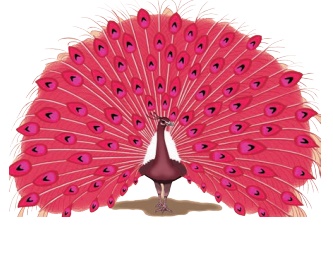
Krishna Deva Raya: You’re right, Tenali.
Chatur Pandit (falls at the king’s feet): Your Majesty, please forgive me.
Krishna Deva Raya: I will do so, but you are banished from the court for a month.
And you must return the gifts you got earlier.
(It starts to rain and the peacocks dance. The rain washes off their red colour.)
Krishna Deva Raya (laughs): Look, Tenali!
(Tenali smiles.)
(The people of the kingdom dance in the rain.)
The people (to each other): We are lucky to have a king who is not afraid to admit his mistake.
(Chatur Pandit walks home alone in the rain.)
G. Answer the following questions based on your listening.
1. Why did Chatur Pandit ask the king for 1000 gold coins?
Chatur Pandit brought a ‘ red peacock’ to the court as his gift to the king. So he asked the king 1000 gold coins for the money that he spent on it.
2. Where did Chatur Pandit find the red peacock?
According to Chatur Pandit, he found the peacock in the jungle.
3. What sort of a person was Chatur Pandit?
Chatur Pandit was greedy and wanted to become rich.
4. State whether the statement is true or false.
Tenali was given three weeks to bring more red peacocks.
This statement is ‘ False’.
5. Why did the people feel that they were lucky to have Krishna Deva Raya as their king?
Krishna Deva Raya was not afraid to admit his mistake of spending the money needlessly. So the people felt that they were lucky to have him as their king.
Speaking
H. Work in groups of four. Choose one of the situations given below. Discuss how the story would have been different if,
i. Pongo had pardoned the narrator after scolding him.
The narrator was not a thief. He was in the habit of stealing. One day, there was a banana boat in the docks he picked up the bananas. But the bananas were not his craze. He loved to eat oranges very much. When he came out from the docks with the oranges hidden in his pockets. Pongo, the policeman caught him. A lot of people were stealing from the docks. The narrator kept quiet and was frightened. Pongo found him very innocent. He did not want any action to be taken against him. He was a kind man. He advised the narrator very politely. Pongo pardoned the narrator. The narrator thanked the policeman and went home happily.
ii. Pongo had arrived on the scene before the last orange was eaten.
The narrator was caught red handed when he came out from the docks. There were seventeen oranges in his pockets. Pongo caught him for his theft and locked him in a cabin. It forced him to eat the seeds and the peels. The narrator had to eat them to destroy the evidence. He ate the oranges quickly. But only one orange was left. At that time, the policemen had come near the cabin. The narrator heard the sound of their arrival. They opened the cabin and found only one orange left on the table. Both of them decided to produce narrator before the court to get him punished, there by teaching a lesson to others.
iii. Pongo had forgotten to lock the door properly but the narrator only discovered it just before Pongo returned.
The narrator was a lover of oranges. He liked to eat oranges one after the other all day and everyday. He had put the oranges in his pockets and came out. Pongo, the policeman noticed his bulging pockets as his apron string was broken. The narrator was calm and he did not say anything. Pongo locked him in a cabin. The narrator was in the cabin. He looked at the walls. He was afraid that he would lose his job and be imprisoned. The policemen were returning to the cabin. Before their arrival, the narrator was surprised to notice the cabin unlocked. The narrator had enough chance to escape from the cabin. But the narrator did not attempt to go out. He remained in the cabin, till Pongo’s arrival. They bowed before the narrator for his honesty and discipline. They released him at once. The narrator thanked them heartily and went back home peacefully.
Share your ideas with the rest of the class.
Writing
I. Work in groups and discuss. Then write a diary entry in about 60-80 words describing your feelings and emotions for the given situations.
Imagine, you are Pongo
1. Your feelings when you caught the boy.
I am Pongo, the policeman. I work as a security guard. One day I was on duty. I saw a boy riding a cart. His pockets were bulged. I stopped him for a casual check. I found 17 oranges in his pocket. He was not a thief. He was a teenager and was scared. So I took pity and let him go. I went to my work with gentleness.
2. Your feelings and emotions when you came back and found the oranges gone
I never thought that I would get a case that day. It was quiet unfortunate. I decided to take action against this boy. I locked him in a cabin. He was frightened. He thought that he would lose his job. The policeman returned to the cabin. The oranges were the only evidence we had. But he could not find the oranges there. I was in sheer disappointment. We became helpless. So we released the boy and he went home cheerfully. The moral is “Man proposes, God disposes”.
Reading
Now, read this hilarious anecdote from the life of a journalist and enjoy.
In 1977, Mr. Nicholas Scotti, a journalist from San Francisco, flew from America to Italy to visit his cousins.The plane stopped for an hour in JFK Airport in New York. Mr. Scotti thought he was at Rome Airport and got off the plane. Of course his cousins were not there to meet him.
Mr. Scotti spent two days in New york believing he was in Rome. In their letters his cousins always talked about the traffic problems and the famous building in Rome. Mr. Scotti decided to find their home without their help.On his journey round the city, Mr. Scotti asked a policeman to tell him the way to the bus station, Mr. Scotti asked him in Italian. Luckily, the policeman was an Italian from Naples, Italy and could reply in the same language.
On the next day, after 12 hours of travelling round by buses, Mr. Scotti was surprised that the policemen and drivers speak in English. A policeman tried to tell him that he was in New york, but Mr Scotti didn’t believe it and even got angry.
J. Complete the following table with information from the anecdote about Mr. Scotti’s short trip.

Answer:
Name : Nicholas Scotti
Occupation : Journalist
Reason for his trip : To visit some cousins
Means of transport : Aeroplane, Bus
Destination : Rome (Italy)
K. Circle(Color) the best option.
1. In New York Mr Scotti left the plane because he thought he
(a) had to change the plane.
(b) was in Rome.
(c) had to phone his cousins.
(d) had to look at the airport.
2. He decided to find his cousins’ home without their help. He asked the policeman for information in Italian because he
(a) thought he was in Italy.
(b) knew the policeman.
(c) didn’t speak any other language.
(d) liked the language.
3. On the next day, Mr Scotti was __________ at how the local people responded to his queries.
(a) surprised
(b) unhappy
(c) glad
(d) upset
4. Circle three words that best describe Mr. Scotti
clever / unlucky / stupid / successful / miserable / happy
L.Have you experienced any unexpected turn of events in your life? What happened? How did you feel about it at that moment? How do you feel about it now? Write an article for your school magazine describing your experience in about 150 words.
The memorable day in my life was the day of our trip to Ooty in my VIII standard. The trip was enjoyable. I and my friends enjoyed a lot. We hired a vehicle to stay in my uncle’s house. We entered a guest house at 8’0′ clock in the morning. The weather was chill. The botanical garden and the rose garden were so amazing. It was a nice experience to see all the flowers together. The trip was wonderful, informative and educative. It was really one of the most memorable one in my life.
Grammar
Phrasal verbs
A phrasal verb is a verb that has a main verb together with an adverb or a preposition or both, to create a completely new meaning.
A. Given below in Column A are some phrasal verbs taken from the text. Find the meanings by using a dictionary and complete Column B.
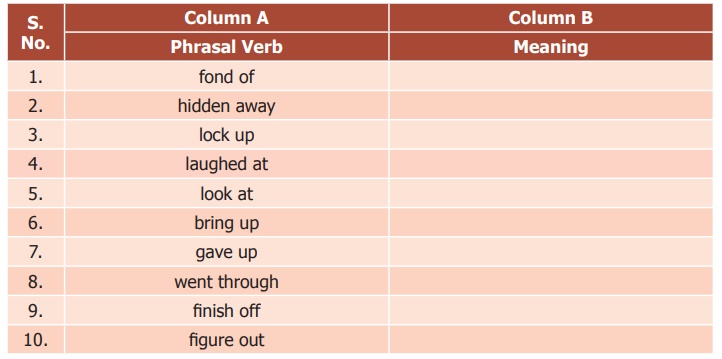
Answer:
Column A Column B
Phrasal Verb : Meaning
1. fond of: liking something pleasant
2. hidden away: concealed
3. lock up: imprison
4. laughed at: ridiculed
5. look at: examine closely /see
6. bring up: rear / to take care of
7. gave up: quit / relinquished
8. went through: examined carefully / undergo
9. finish off: destroy something / complete
10. figure out: solve / work out
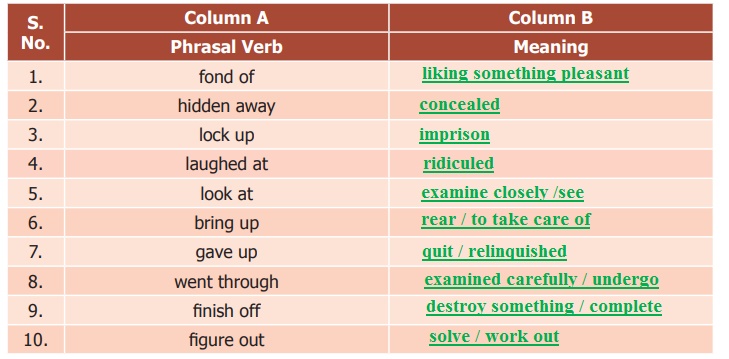
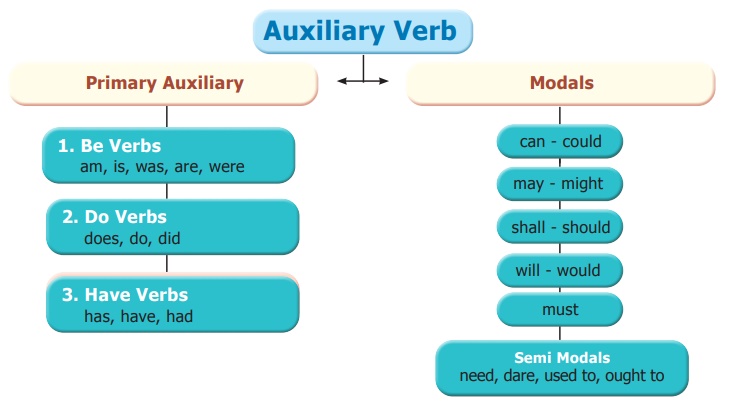
Modals
Must
Expressing
* strong obligation
* logical conclusion
* certainty
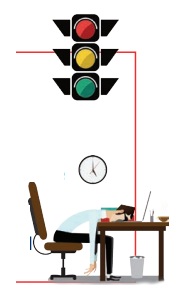
Example
* You must stop when the traffic lights turn red.
* He must be very tired. He’s been working all day long.
Must not
Expressing
*prohibition

Example
* You must not smoke in the hospital.
Can
Expressing
*ability
* permission
* possibility
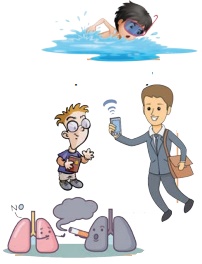
Example
* I can swim.
* Can I use your phone please?
* Smoking can cause cancer.
Could
Expressing
*ability in the past
*polite permission
*possibility
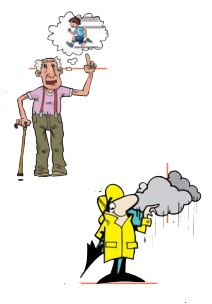
Example
When I was young I could run fast.
Excuse me, could I just say something?
It could rain tomorrow!
May
Expressing
* permission
* possibility / probability
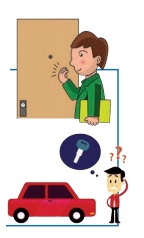
Example
* May I come in?
* Where are my keys? They may be in the car.
Might
Expressing
* polite permission
* possibility / probability

Example
* Might I suggest an idea?
* I might go on holiday to Australia next year.
Need not
Expressing
*lack of necessity/ absence of obligation

Example
I need not buy tomatoes. There are plenty of tomatoes in the fridge.
Should/ought to
Expressing
*50 % obligation
*advice
* logical conclusion

Example
* I should / ought to see a doctor. I have a terrible headache.
* You should / ought to revise your lessons
* He should / ought to be very tired. He’s been working all day long.
Uses of Auxiliary vebs
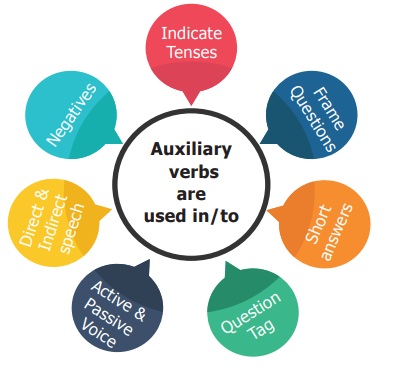
B. Can You do It?
* Talking about the abilities of your class members is a great way to review the use of the modal can.
* Work in pairs and discuss things a person might be able to do. Include things that some people can do and others cannot do, and make a list on the board.
Can you?
Example: Can you play the guitar? Now you try:
Can you Play drums ?
Can you draw a picture?
Can you buy a car?
Can you ride a bicycle?
* Once your list has 30-50 abilities, it’s time to prepare for the game.
* Each of you will be given a blank paper and fill in the spaces with one of the abilities you listed on the board.
* Then, when the teacher says go, go around the classroom asking each other “Can you _________?” asking about one of the activities listed on the board.
* If the person you ask can do that activity, you mark off the square with his/her name.
* If the person asked cannot do it, move on and ask another person about that ability or another one on your paper.
* You can only ask each person about one ability before moving on to ask another classmate, but you can come back to the same person as often as you like.
* When someone gets five spaces in a row, he calls “BINGO.”
Write it on the paper
Can you play Cricket?
Mugunthan
Can you sing songs?
Malar
Write down all the ‘can do activities’ from the board and write down your classmates’ names in the box
C. Do’s and Don’ts (Necessity, Obligation and Permission)
Choose the correct option.
1. We use must (should/must/ought to) when something is compulsory, obligatory and important.
2. We use should (should/must/ought to) when something is the right thing to do.
3. We use ought to (should/must/ought to) when something is suggested or recommended.
D. Complete the sentences with one of the modal verbs given below.
can, can’t, could, couldn’t, may, shouldn’t
1. Students may be quiet when they write the examination.
2. You shouldn’t wear a coat, it’s quite warm.
3. could you open the window? It is very hot in the room.
4. I couldn’t go to the school yesterday because I was ill.
5. When she was eighteen, she could run fast.
6. You shouldn’t drive fast. It’s not safe.
7. Sachin is a famous cricketer. He Can bat well.
E. You are Aadhav. While you were away on a holiday, your house was burgled. Use appropriate modals and complete the letter to your friend telling him/ her about it.
No. 36, Gandhi Road
Chennai – 45
04 August 2018
Dear Ramesh,
How are you? I feel sad to inform you that my house was burgled last week when I was on a holiday. Burglars might / would have known from the accumulated newspaper pile that I had gone away. When I came back last Sunday, I found the back-door lock broken. I could / might have forgotten to bolt the back-door from inside and they should have entered through it. My room was ransacked. They took my laptop and other valuables. I must / should have deposited the jewellery in a bank locker to avoid this loss. I should have informed my neighbours about my week-long trip. Well, I have registered an FIR with the police. They are investigating the case. They have assured that I would / shall get my jewels back. The burglars will be caught very soon. Convey my regards to all at home.
Yours lovingly,
Aadhav
F. Match the Squares to form proper sentences.
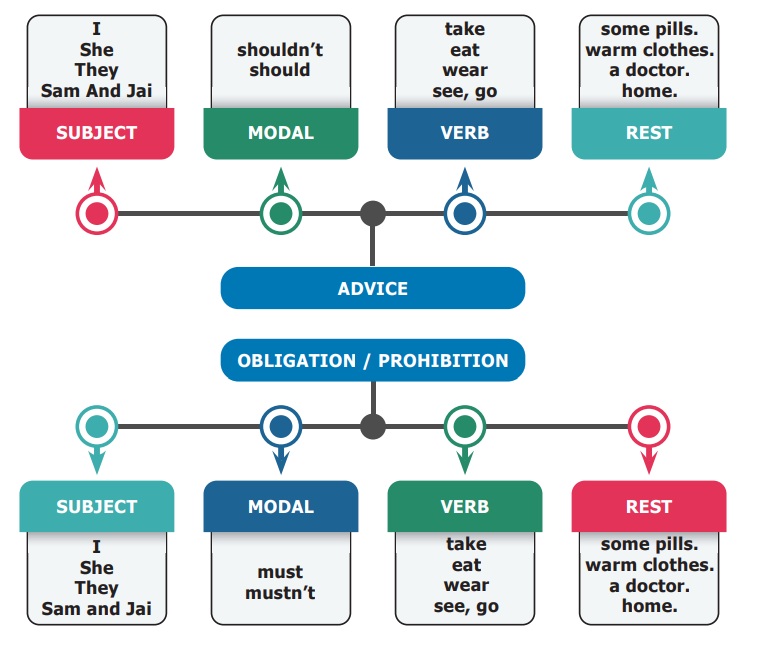
Answers:
1. I/She should take some pills
2. She/They shouldn’t wear warm clothes.
3. She/They shouldn’t go home.
4. Sam and Jai should see a doctor.
Obligation /Prohibition
1. Obligation
(a) I/She/They must take some pills
(b) She must wear warm clothes.
(c) I/She/They/Sam and Jai must see a doctor.
(d) I must go home.
2. Prohibition
(a) She mustn’t take some pills.
(b) I mustn’t wear warm clothes.
(c) .Sam and Jai mustn’t go home.
(d) They mustn’t see a doctor.
Note: Rewrite the sentences for other subjects.
G. Fill in the blanks with appropriate modals.
(will, shall, would, should, can, could, may, might, ought to)
Milk is a nutritious food enriched with vitamins and proteins. We should take milk regularly so that we shall / will not develop deficiencies in our body. Aged persons, children and patients should take milk in sufficient quantities as it provides strength to their body. We could / should supplement it with fruits, vegetables and pulses for proper growth of the body. But we should consume milk of good quality. Otherwise it may cause harm to the body. We should / ought to be very careful while selecting our food items because there are chances that these might / may be adulterated. We should / must protect our health.














